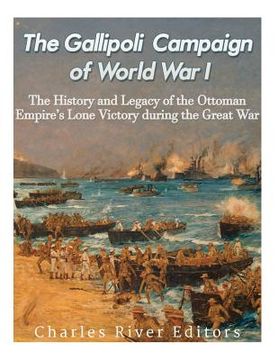The Gallipoli Campaign of World War I: The History and Legacy of the Ottoman Empire's Lone Victory during the Great War (en Inglés)
Reseña del libro "The Gallipoli Campaign of World War I: The History and Legacy of the Ottoman Empire's Lone Victory during the Great War (en Inglés)"
*Includes pictures *Includes accounts of the fighting *Includes online resources and a bibliography for further reading Early in the war, the Ottomans knew the Dardanelles strait would most certainly be attacked and had prepared significant defenses. The plan drafted by the then First Lord of the Admiralty, Winston Churchill, was meant to destroy Ottoman defenses along the Dardanelles. However, Allied forces comprised of British, Irish, Australian and New Zealand troops were unable to penetrate the Ottoman defenses, advancing only about 100 meters from the shores. The Ottomans, led by German General Liman von Sanders, further reinforced their positions. The later attempt of the British to establish a new beachhead was more successful, yet the British government refused to send significant reinforcements. In December 1915, what was certainly the most successful part of the Gallipoli offensive, the evacuation of the British forces began. The Ottomans' successful defense of the Dardanelles led to Churchill's resignation. More importantly, it bolstered the rising popularity of Mustafa Kemal, then Lieutenant Colonel, and offered hope that the Ottomans could indeed counter-balance their territorial losses. The successful defense of Gallipoli, however, convinced both Enver and Djemal that a second operation should be launched. Reinforcements arrived from Gallipoli and the Ottomans launched the second attempt in August 1916. British forces had, however, moved eastward toward Palestine, and they defeated the Ottoman forces at the Battle of Romani. The battle was the first clear British victory over the Ottomans and their German allies, resulting in a successful counter-offensive that led British General Edmund Allenby in Jerusalem. A final push with the Megiddo offensive and renewed campaign in Mesopotamia brought Entente forces even further into the Ottoman Empire. The Arab revolt has been engraved in modern memories by movies such as Lawrence of Arabia as a widespread nationalistic movement against the cruel Ottoman occupier. The reality is far more complex. In 1914, as the Ottomans entered the war, the Arabs' loyalty to the Sultan and Caliph was not in question. Arab nationalism did indeed emerge in the wake of the revolution of 1908, but it mostly attracted Arab intellectuals as the local population remained loyal subjects of the Empire. European encroachment on several former Ottoman provinces such as Algeria, Libya, Tunisia and Egypt made the danger of a possible Arab revolt relatively clear. The fall of the Ottoman Empire set the geopolitical scene of the new Middle East. In 1920, two years after the end of the war, the region was already experiencing growing instability. The issues and trends that would plague the region until today were growing. On April 4, Arab riots broke out in Jerusalem, fueled by the growing hostility against the Zionist movement. The British passivity would convince one of the Jewish leaders, Vladimir Jabotinsky (the future founder of the Israeli right-wing), of the strategic necessity of a strong Jewish military as the core of the future state. Just two weeks later in Turkey, the Grand National Assembly in Ankara set the foundation of the Turkish state, opening the way for 8 years of reforms. In Iraq, a Shiite revolt broke out in the south, as locals demanded the creation of an Islamic state. The British compromise was to place Faisal, the son of Sharif Hussein and a Sunni, on the throne. His father, meanwhile, was embroiled in a conflict with a local tribe, the Ibn Saud, that sought to carve a new kingdom in the Arabian Peninsula. These challenges, divides, and conflicts all stem from the power vacuum slowly left by the once powerful Ottoman Empire, and much of it stemmed from the events surrounding Gallipoli in 1915.

